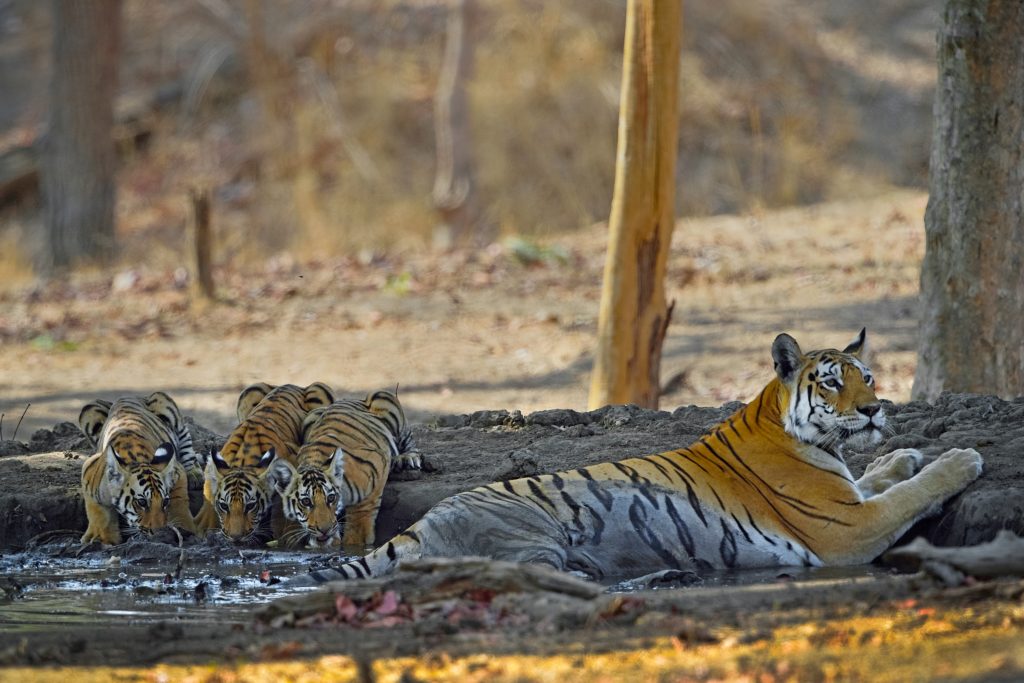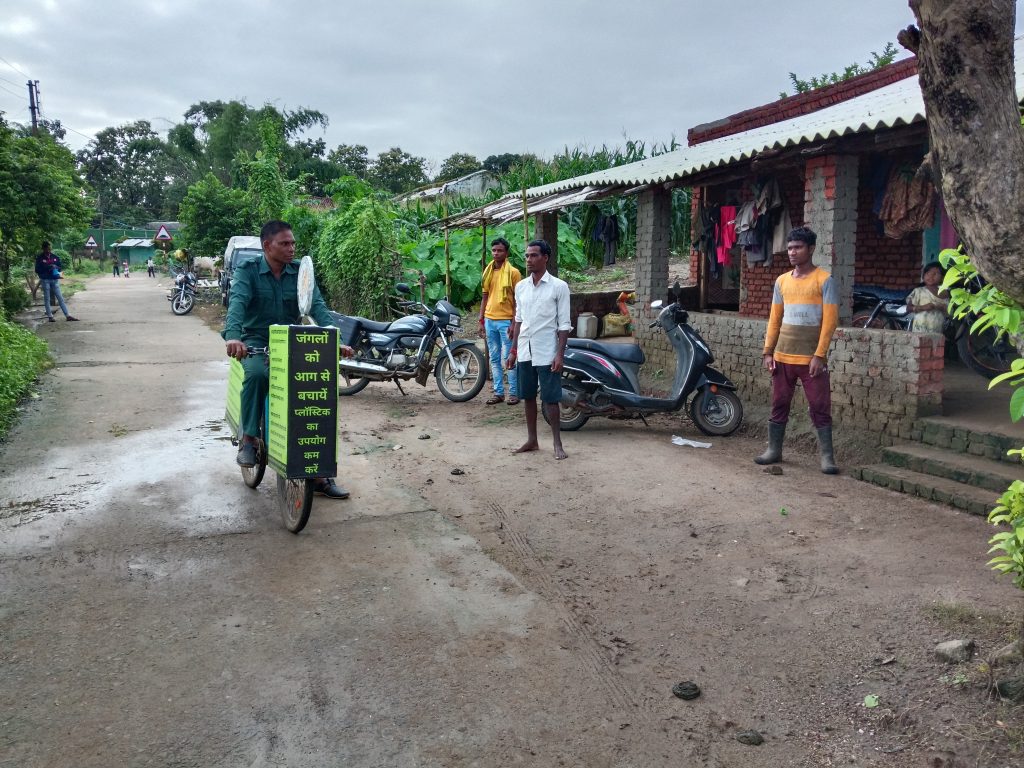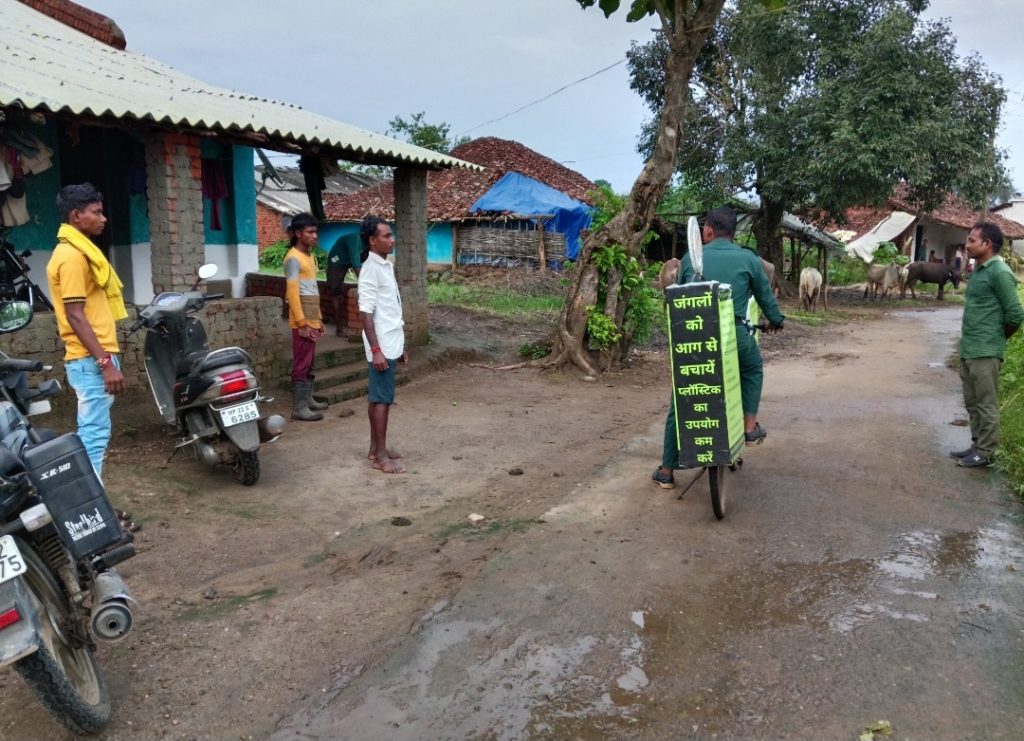This unique initiative started in the Pench Tiger Reserve after a human death occurred in December 2022. A report by Deepanwita Gita Niyogi

Prakash Uikey has been riding a bicycle in Madhya Pradesh’s Pench Tiger Reserve for the past one year. His objective is simple: to spread awareness on human-tiger conflict in the villages lying in the reserve’s buffer area.
This unique initiative started in Pench after a human death occurred in the month of December 2022, informed Shubham Baronia, range officer of Rukhad buffer area, Pench Tiger Reserve. “After a man, about 70 years of age, was killed in a tiger attack, people blamed the forest department for the incident. Many pointed out that they were never made aware about tigers. It was then the authorities decided to engage with communities so that they could learn about ways to protect themselves from animals. Earlier, 100 per cent attendance did not happen, as the elderly and women usually skipped the meetings,” Baronia said.
As part of his daily duty, Uikey visits villages like Chandrapur, Pindrai and Kurai. A considerable time is spent on engaging with the residents of a big village and in making them understand about human-wildlife conflict. “Those who are mature listen patiently. Some people demand that tigers should be removed to prevent deaths,” Uikey said.
A novel idea
The incident of December 2022 occurred when the victim, a resident of Gondegaon village in Pench, went to a nullah in the morning which is sometimes used by tigers too. At that time, an encounter happened. Usually, tigers do not launch attacks and change their course. After the incident, the deceased’s family received Rs 8 lakh as compensation.
In the buffer range of Pench dotted with villages, labourers or shramiks like Uikey ride cycles to issue warnings from time to time under the Sayane Mowgli ki Cycle initiative named after the beloved fictional character in Rudyard Kipling’s The Jungle Book. The labourers carry out their duty for the forest department and then ride cycles for a few hours to cover the villages. They get a monthly salary.
According to Baronia, four wheelers could have been engaged but cycles are better. They are eco-friendly and can stop conveniently at every village. The cycles have been made attractive so that people spare a few minutes to read the set of instructions hoisted on them and listen to what the riders have to say. The riders have been hired from the villages which makes conversation easy.
“Apart from the set of instructions, phone numbers are also mentioned so that people can contact us whenever there is a need. This initiative has helped the department form an attachment with people,” Baronia added.
The Pench Tiger Reserve in Seoni district of Madhya Pradesh has no village in its core area as all of them have been relocated. At present, there are 107 villages in its buffer. Some of the houses are still kuccha like in the old times but most of them are now pucca.
Towards a peaceful coexistence
Jile Singh Dhurwey, who has been posted in Pench since 2005, said there are four circles in the Rukhad buffer range. He is a permanent employee of the forest department.
“Under the Sayane Mowgli ki Cycle initiative, one cycle covers one circle in a week and then goes to another circle. The cycle riders are accompanied by beat guards. The rides always take place except during festivals. People question us on these visits. When a cycle rider arrives at a particular village, people surround him. They read the instructions. If they cannot understand something, detailed explanations follow,” Dhurwey said.

The cycle rides start in the morning and continue till the evening. Dhurwey explained that apart from the human-wildlife conflict issue, people are asked to protect the forest from fires, reduce the usage of plastics, desist from feeding animals and discard waste in bins.
The employee admitted that the focus is more on tigers, as sometimes the animals are seen near agricultural fields which lie near the forest. People are also urged to collect mahua flowers in groups, not to go inside forests in the evening and play songs on mobiles while walking. Many people enter jungles to collect mushrooms also.
Most attacks happen during the evenings when cattle herders are on their way home. Tigers often attack cattle. “During such times, herders should not try to stop them. If tigers are spotted on roads they should not be disturbed. Sometimes, people get excited on seeing tigers.”

Dhurwey admitted that earlier people used to get angry, but now they try and understand. He recalled an incident a few years ago when the mob turned violent after a human death occurred in a village. The victim had gone to the forest early in the morning to collect the seasonal mahua flowers.
“When women get angry, controlling them is difficult, especially when there are male staff. In Pench, women also take out cattle for grazing,” Dhurwey said.
At present, Pench has an estimated 123 tigers and Madhya Pradesh is India’s tiger state with about 785 tigers. Like Uikey, Vinod Bhalavi also rides cycles on a weekly basis and has seen tigers while on duty. But he affirms that he does not feel afraid even though some people become apprehensive.













